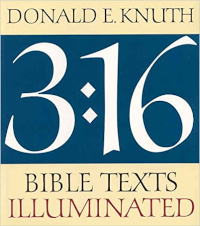
The Stratified Bible


|
The Stratified Bible |

|
When he volunteered to teach a Bible study course, Donald E. Knuth, computer scientist, master programmer, creator of TeX, inventor of Literate Programming, and author of The Art of Computer Programming, pondered the two main ways of reading the Bible.
Method 1: We can read it straight through, for context. By reading at normal speed, we can follow the flow of ideas and get intuitive impressions, just as the first readers and hearers of those words might have done. Or, Method 2: We can single out isolated verses, for meditation and/or scholarly study. By focusing on small details, it’s possible to understand the deeper significance of a passage.
Both of these ways are important. Method 2 is most satisfactory for group study, since Method 1 works best when a person can read at leisure and without interruption.
My idea for a Bible class was based on a fourth way to select Bible verses for study, making use of a mathematical principle that provides an effective way to gain knowledge about complicated things: A large body of information can be comprehended reasonably well by studying more or less random portions of the data. The technical term for this approach is stratified sampling.
Knuth’s idea was to pick a chapter and verse number, essentially at random (but with the chapter and verse numbers not so large they excluded too many shorter books and chapters), then examine that chapter and verse from each book in detail.
But how to select the passages to study? After surveying various ways to study scripture, Knuth chose a different approach.
During the next four months I found that the selected material unfolded itself almost magically. The class succeeded beyond my wildest dreams.

He summarised the experience and results in the 1991 book 3:16 Bible Texts Illuminated. For some reason, Amazon.com lists only used copies of this book, often as collector's prices, while it remains in print and may be ordered directly from the publisher via the link above. Here are Prof. Knuth's notes and errata for the book.
Choosing chapter 3 and verse 16 (well known from the Gospel of John, but with no special significance in any other book), he surveys every book that contains such a chapter and verse (two books of the Old Testament and five of the New are too short and omitted), providing a detailed exegesis of the book and the specific verse, with each verse illustrated by an eminent calligrapher.
As with so much else Knuth has done, it is unconventional, but
brilliant and it works.
I found Knuth's work so enlightening and inspiring, it occurred to me that since Fourmilab has been home to on-line editions of the Bible since the dawn of the Internet, with texts accessible by verse in English, Latin, and Hebrew, it would be but a “simple matter of programming” to build a tool which could easily extract stratified samples as Knuth did for independent or group study. This is the result.
To extract a stratified sample from the entire text of the Bible (Old and New Testaments), enter the chapter and verse you wish to sample in the boxes below. If one or more books does not contain such a chapter or verse within it, this will be noted in the result page. This simplified request displays verses with the specified chapter and verse from all books of the Bible, Old and New Testaments, in English (King James Version), Latin (Vulgate), and Hebrew (Old Testament only, Koren Tanakh). To reproduce the verses in Knuth's book, enter 3 as the Chapter and 16 as the Verse number.
Output shows, for each book of the Bible containing a verse with the given chapter and verse number, the verse in English, Latin, and Hebrew, using a different font of each to distinguish them. (Hebrew test is available only for books of the Old Testament.) Each verse, in each language, is linked to that verse in context within the book where it appears. (To avoid clutter, the verses are not obviously marked as links, but clicking them still works.)
If you enter zero for either Chapter or Verse, a randomly-selected number within the range of those within each book of the Bible will be chosen. Random selection avoids books being skipped because they do not contain a chapter or verse within that chapter specified for the sample, and allows better sampling of books with many chapters (for example, Psalms) and verses (Psalm 119).
To customise your request, selecting languages and portions of the Bible to sample, use the Stratified Bible Custom Query page.
|
by John Walker February, 2022 Stratified Bible Custom QueryFull Bible Text in English, Latin, HebrewBooks On-Line at FourmilabFourmilab home page |